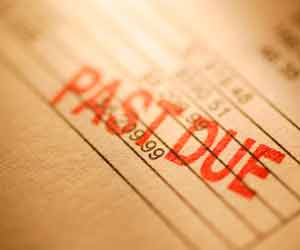Debt Payoff Methods – Credit Cards, Checks, and More
Check by phone is a popular method with recurring payments over a time. This is because it is possible to obtain authorization to post-date each payment in the arrangement. When this situation occurs, the agency must send a post-dated check reminder letter no less than three days and not more than ten days from the date of check if the check is post-dated for more than five days. Some states also regulate the practice of securing post-dated checks for payment of debt, for example, Massachusetts does not allow debt collectors to take post-dated checks at all.

One of the drawbacks for taking checks for debt collection is the possibility that the funds will not be available upon deposit of the check. When this occurs, the check is unpaid due to non-sufficient funds, or NSF. The collector must then contact the borrower and recover the bad payment. Often, when this occurs, the borrower must use alternative payment method, as most will no longer accept payment via their checking account when a check comes back NSF. Obviously, this creates yet more work for the collector who has already expended much effort to obtain the payment in the first place, so it is not a very good situation all around when this occurs.
Even though there are some drawbacks using checks for payment arrangements, they remain popular. One of the reasons for this is when a collector works for a commission they are able to build up their payments for the following months. This strategy can allow a collector to begin a month already in commission, allowing all moneys collected in that month to count towards their bonus. Usually, in the case of third party collection, if the borrower defaults on a payment arrangement, and the agency sues for payment, the check is an identifiable asset source for a bank levy.
Credit cards are popular because it is possible to verify that the funds are available at the time of payment. This is especially true when accepting a rather large payment, such as a settlement. However, authorization is required each time a payment is processed, and therefore it is not possible to post-date a credit card payment, requiring the collector to contact the borrower each time to receive the scheduled payment in the arrangement. One of the drawbacks of credit card payments is the possibility of a chargeback to occur. To explain, a chargeback would occur when the person rescinds the payment through the credit card issuer. The period of time that this is possible is 60 days, and until that time has elapsed, there is technically no actual guarantee of payment.
Money Gram and Western Union provide a payment service that they market to the debt collection industry. For a flat fee, the borrower can use these methods to pay the debt. The funds are verifiable and as good as receiving cash in person. However, one of the drawbacks to using these methods are the inability to postdate payments, and the necessity of following up with the borrower for each scheduled payment. In the instance that the borrower does not have access to a bank account or a credit card with which to make their payment, these methods are much more acceptable than a promise to pay via mail.
Payments that arrive via mail are accepted, but not considered a valid payment arrangement. This is due to the unreliability of promises to pay via mail. Emphasis is on standard methods of payment, such as checks or credit cards. However, there may be instances where a more suitable payment method is not available, and a debt collector will have to accept an arrangement where the borrower mails in their payments. This is a time-consuming method, avoided where possible because of the effort involved in following up with the borrower for each payment.

